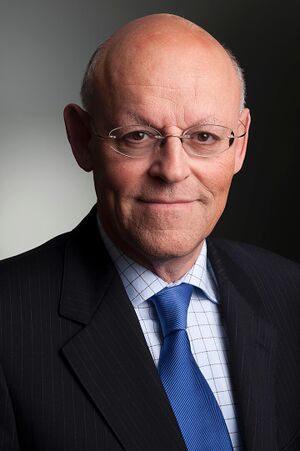Uri Rosenthal
(politician, political scientist) | |||||||||||||||||||
|---|---|---|---|---|---|---|---|---|---|---|---|---|---|---|---|---|---|---|---|
 | |||||||||||||||||||
| Born | Uriël Rosenthal 19 July 1945 Montreux, Switzerland | ||||||||||||||||||
| Nationality | Dutch | ||||||||||||||||||
| Ethnicity | Jewish | ||||||||||||||||||
| Alma mater | University of Amsterdam, Erasmus University Rotterdam | ||||||||||||||||||
| Children | 2 daughters | ||||||||||||||||||
| Spouse | Dinah Rosenthal | ||||||||||||||||||
| Member of | Global Commission on the Stability of Cyberspace | ||||||||||||||||||
| Party | People's Party for Freedom and Democracy | ||||||||||||||||||
Dutch politician
| |||||||||||||||||||
Uriël "Uri" Rosenthal is a retired Dutch politician and political scientist. He attended the 2011 Bilderberg conference as Minister of Foreign Affairs.
Contents
Early life
Uriël Rosenthal was born on 19 July 1945 in Montreux, Switzerland to Jewish parents who during World War II fled the Netherlands from the German occupation of the Netherlands. They returned to the Netherlands shortly after the war ended.[1]
Education
After attending school in The Hague, he went to study political science at the University of Amsterdam, where he obtained a Bachelor of Social Science and a Master of Social Science in 1970. In 1978 he received his Doctor of Philosophy in social sciences at the Erasmus University Rotterdam.
Career
In 1980 he became a professor of political science and public administration at the Erasmus University Rotterdam. From 1987 until 2011 he was a professor of public administration at the Leiden University. he wrote among other things the study Coping with crises: The management of disasters, riots and terrorism (1989)[2] and The evil of terrorism (2007)
He was elected Member of the Senate as a member of the People's Party for Freedom and Democracy and took office on 8 June 1999. He became the Parliamentary leader in the Senate on 5 May 2005. Mark Rutte asked Rosenthal to become the Minister of Foreign Affairs in the new cabinet.
Foreign Minister
The Netherlands was part of the 2011 attack on Libya.[3] The country was also part of the 2011 proxy war against Syria. In March 2012, Rosenthal had a meeting in the Netherlands with representatives of the Syrian National Council, which were openly supported. He emphasized that President Assad should step down and that the groups should unite.[4] He also called for members of the UN Security Council to agree on "targeted" sanctions against Syrian officials.[5]
In 2011 the Netherlands temporarily froze official contacts with Iran.[6] The pretext was the execution of a Dutch-Iranian woman for being part of a drug-smuggling ring, but which in Commercially-controlled media was implied as a political punishment[7] The woman had a previous conviction in the Netherlands, found guilty of smuggling nearly 16 kilos of cocaine from the Caribbean in her luggage in 2003. [8]
In November 2011, the Netherlands wanted to extend the scope of European Union sanctions against Iran, including measures against Iran's central bank to stop certain types of money flows. Foreign Minister Uri Rosenthal said in a statement that Iran's cash and gold transactions which bypass sanctions should be stopped, key government officials should be put on a sanction list and new sanctions for Iran's oil and gas sector should be considered.[9]
Later career
As of March 1, 2013, Rosenthal was chairman of the advisory council on Science and Technology Policy (AWT).[10] He was also chairman of the Council for Civil-Military Care and Research (rzo) from 25 April 2014.[11]
From 2013 until March 2017 Rosenthal was the Dutch Government’s Special Envoy for International Cyber Policy.[12]
Event Participated in
| Event | Start | End | Location(s) | Description |
|---|---|---|---|---|
| Bilderberg/2011 | 9 June 2011 | 12 June 2011 | Switzerland Hotel Suvretta St. Moritz | 59th meeting, in Switzerland, 129 guests |
References
- ↑ https://www.ewmagazine.nl/opinie/opinie/2018/11/biografie-rosenthal-leerzaam-migranten-654557/
- ↑ https://catalogue.nla.gov.au/catalog/193078
- ↑ https://english.defensie.nl/topics/historical-missions/mission-overview/2011/operation-unified-protector-in-libya/dutch-contribution
- ↑ https://web.archive.org/web/20160405125150/https://www.rijksoverheid.nl/actueel/nieuws/2012/03/08/rosenthal-spreekt-oppositie-syrie
- ↑ https://news.un.org/en/story/2011/09/389212
- ↑ https://www.voanews.com/a/the-foreign-minister-of-the-netherlands-uri-rosenthal-speaks-during-a-news-conference-after-a-me--114897169/134249.html
- ↑ https://www.voanews.com/a/the-foreign-minister-of-the-netherlands-uri-rosenthal-speaks-during-a-news-conference-after-a-me--114897169/134249.html
- ↑ https://web.archive.org/web/20110205021551/http://nieuwsuur.nl/onderwerp/215523-geexecuteerde-bahrami-eerder-veroordeeld-voor-drugssmokkel.html
- ↑ https://www.reuters.com/article/iran-sanctions-dutch/dutch-favour-tougher-sanctions-against-iran-idUKLDE7AM01320111123/
- ↑ http://nos.nl/artikel/474693-rosenthal-leidt-wetenschapsclub.html
- ↑ http://www.defensie.nl/actueel/nieuws/2014/04/25/uri-rosenthal-gaat-toezien-op-veteranenzorg
- ↑ https://thegfce.org/person/uri-rosenthal/